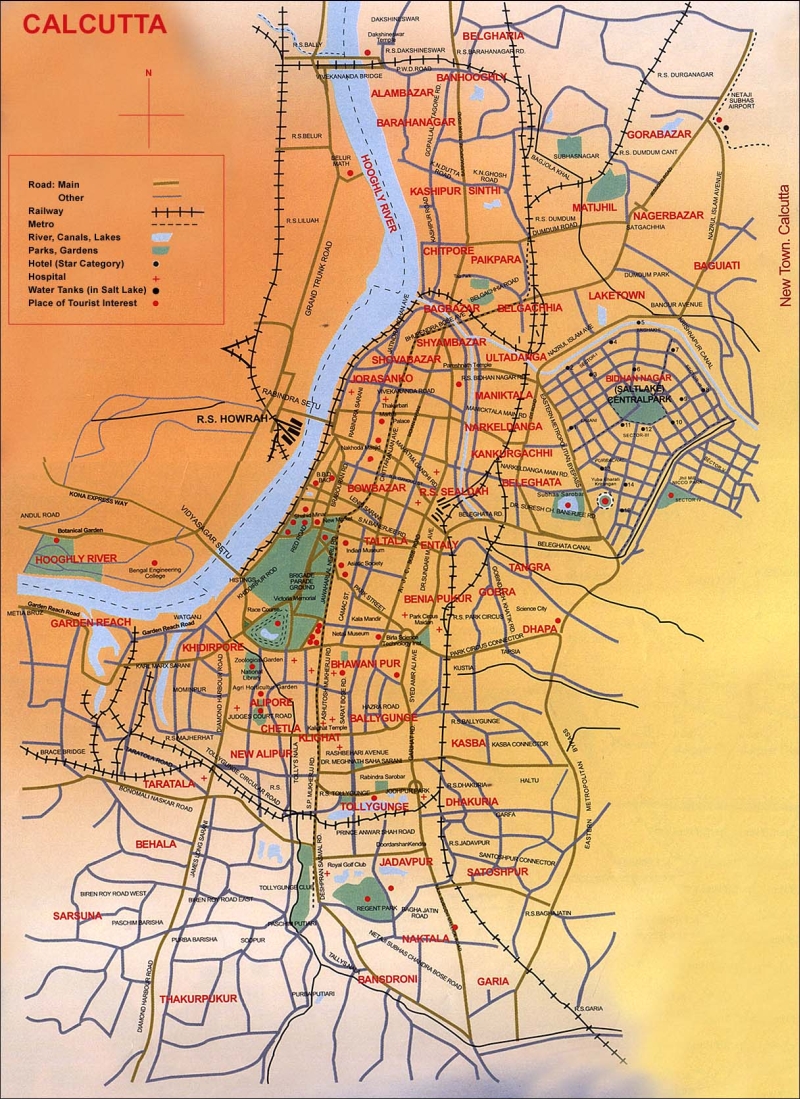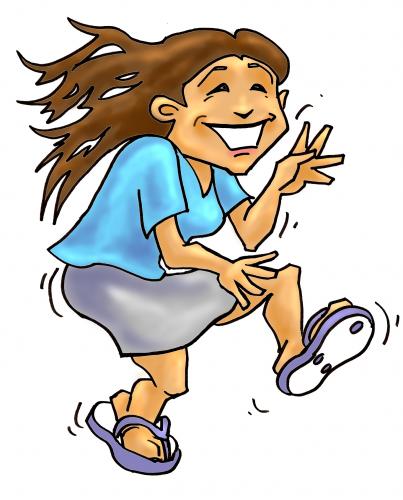 |
| Map Of Calcutta |
Calcutta, now called Kolkata to most out there, was once the iconic capital of British India. Located in the once booming Bengal region, Calcutta is one of India’s major cities. However politics and corruption are two reasons why the city is on a rapid decline.
Here’s looking a lot of things that are uniquely Calcutta or have had their roots in this bustling metropolis.
THE TRAM: Calcutta is the only city in India with a tram network. The trams consist of two carriages, powered by electricity (incase you haven’t noticed, now you know), which ferry Calcuttan’s from place to place (unless there is a power cut, then you are stuck.) The trams are in need of a major overhaul as the Government has begun knocking off the only non polluting means of transport from the city, to speed up the automobile traffic, which is adding to the already high amount of pollution.
THE METRO: Calcutta was once the only Indian city with a working metro line. (Yes ONE line.) However Delhi now has a much more efficient network though I haven’t used it yet. The metro speeds under the perpetually jammed roads of the city ferrying Calcuttans from place to place (unless its Sunday morning, then you have no metro because the drivers and officials are enjoying a day when duty starts later than usual.) Expansions have begun in and around Salt Lake and a multi line metro is expected in 2013 (unless the world ends before completion). Till that time the metro has another use, the tracks are commonly used by civilians to commit suicide.
HANDPULL RICKSHAWS: Calcutta’s indispensible mode of transport, these rickshaws are pulled by a person who runs through the city roads causing jams and utter chaos. Incase you were wondering why the name hand pull rickshaws, it is because the two seater carriage is pulled by a man (as mentioned above, dimwit). High time Calcutta does away with such a pathetic means of transport. They do have their advantages and when the streets are flooded and vehicles stall they are the one mode of transport that will get you on the roll.
KATHI ROLLS: Calcutta’s own invention, the Kathi roll, or just roll, is a paratha which is usually filled with either chicken, mutton, paneer, egg, beef (yes, beef) in a number of various combinations along with a lot of vegetables and sauces. The roll is Calcutta fast food and enjoyed by many as a quick bite to pick when on the move. This unique delicacy is definitely a must try.
PUCHKAS: Bombay’s pani-puris are Calcutta’s puchkas (with a Bengali twist to it.) A stuffing of potatoes and spices are filled in a casing made from God knows what, served with tamarind water. Puchkas are famous but when it comes to giving people upset stomachs it usually heads the list. Long live the puchka. Calcutta can’t do without it and neither can I.
RASGULLA: Another local invention, the rasgulla, was invented by Nobin Chandra Das in 1868. The rasgulla is simply a small white spherical ball made from the fat separated from milk and served with sugar syrup. Indispensible and it would drive anybody to the dentist, even the ones without teeth. But the Bengali meal is incomplete with slurping and gobbling it!!
NEW MARKET: Officially called the S.S.Hogg market (do you really care?), New Market is an iconic age old market famous for its shops just like how any ordinary market would be famous. Located in the Chowringhee area of the city this market is where one finds everything. After a lean period when the city sprouted several swanky malls New Market is now fighting back and offers surprise bargains to surprised shoppers. Probably the most famous shop in the market is Nahoum’s located at the center of the complex.
VICTORIA MEMORIAL: Built by the British as a tribute to Queen Victoria the Victoria Memorial in Calcutta is at least ten times bigger than the one in London! We wonder why? To quote Obelix “These Britons are crazy!!” Situated somewhere in the city in a large garden that is overrun by morning walkers at unearthly hours, the beautiful building is now a museum. The angel atop the monument has been in the news quite often as it has stopped rotating. (Probably to avoid seeing the decay and dirt strewn around.) Another unique thing is the unique entry rates for locals and foreigners. Genius I tell you, Rs. 4 for Indians and Rs. 150 for foreigners. Strange, but then this is Calcutta.
HOWRAH BRIDGE: The world’s sixth largest cantilever bridge connects Calcutta to Howrah. Without this bridge Calcutta would not have a major train station. Built by the British the bridge is used by 80,000 vehicles each day, numerous pedestrians and even acrobats who try scaling the bridge for fame and simply because this is Calcutta. Despite the construction of a new bridge where one has to pay toll and traffic is far lesser, most Calcuttan's use this old bridge and cause an unnecessary jam adding to the cities woes.
ST. XAVIER’S COLLEGE: Located on Park Street, St. Xavier’s College and school has been around for a hundred and fifty years. Run by Jesuit priests, the school and college has given numerous eminent personalities to the city- Sourav Ganguly, Jyoti Basu, Lakshmi N. Mittal, Rabindranath Tagore, Siddhartha Shankar Roy, Jagdish Chandra Bose and Norman Pritchard to name a few. St. Xavier’s is truly a renowned landmark in the city.
MOTHER TERESA: Calcutta’s ‘Saint of the Gutter’, Mother Teresa was born Agnes Gonxhe Bojaxhiu in Skopje Macedonia in 1910 and was moved by the sight of intense suffering of the city’s poorest of people. She formed the Missionaries of Charity and devoted the rest of her life to serving the dying, destitute and the poorest of the poor of Calcutta. Mother Teresa was truly a ray of hope and inspiration for all the unfortunate. She was awarded a Nobel Peace Prize in 1979.
NETAJI SUBHAS CHANDRA BOSE: Arguably Bengal’s most famous freedom fighter, Netaji was the founder of the Indian National Army and was instrumental in driving the British out of India. He maintained ties with the Japanese and the Nazis of Germany. A mysterious plane crash in 1945 claimed his life but it was strongly believed by many Calcuttans that their beloved Netaji was still alive as late as 1985. Unbelievable? Believe it.
RABINDRANATH TAGORE: Bengal’s most famous son, Tagore was born in 1861 in Calcutta. He was India’s first Nobel laureate. A very talented poet, playwright, philosopher, composer and artist, he won himself world recognition with his most famous work ‘Gitanjali’. Tagore is the writer of the national anthems of both India and Bangladesh. His Rabindrasangeet is still popular in Calcutta today. Tagore is truly an inspiration for all Calcuttans.
BANDHS: Calcutta is not complete without its own share of bandhs. You might tell me that the entire country often falls victim to bandhs but they are more frequent in Bengal. It is said that the word ‘gherao’ was born on the streets of the city. Usually called by the TMC and the CPI(M) they disrupt the day to day activities of course we students look forward to these unscheduled holidays. Yet people wonder why Bengal does not prosper like it used to!
SALT LAKE STADIUM: The world’s second largest stadium, officially called the Yuva Bharati Krirangan is in ruin. The 120,000 seater stadium is home to Mohun Bagan, East Bengal and Mohammedan Sporting football clubs. Even though the stadium is in dire need of renovations, the authorities seem unconcerned and look like they want the stadium to collapse. However if one is lucky to watch a game from within the stadium, the experience is magnificent.
EDEN GARDENS: The Eden Gardens is India’s largest stadium and is situated right here in Calcutta. The stadium is under repairs and it saw its first international match after almost three years on December 24th, 2009. Unfortunately for Calcutta this is not at all a good sign as the city is being neglected by the CAB. However the stadium has and will always be essential to Calcutta especially during the IPL seasons.
BOOK FAIR: Calcutta is incomplete without the book fair. Usually occurs around January, it seems that every Calcuttan has to make a visit to the book fair. The sale of books is the last priority as people often meet for a bit of ‘adda’ and usually end up in the food court(which I may add was once the cause of a major fire.) Also the book fair is famous or the phrase” I got lost in the book fair.” Let’s hope that this year there will a bit more book buying and less of the needless ‘adda’.
Here we see some of Calcutta’s most famous landmarks and some of the most famous people who have been associated with the city. The Indian Government must improve the infrastructure of Calcutta so that the city can rival with other cities. The lackadaisical attitude of most civilians and government officials must be done away with if we are to save the CITY OF JOY from ruining itself. Here’s to all Calcuttans out there...
Photo Credit:
http://mappery.com/maps/Calcutta-City-Map.jpg





